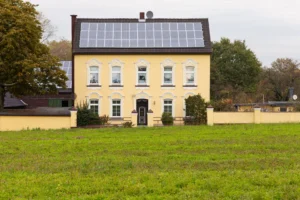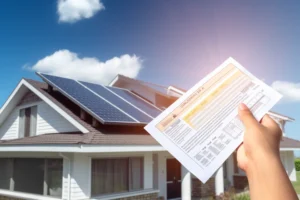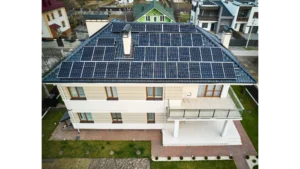
The rise in popularity of solar panels has led many homeowners to consider installing them on their properties. While the environmental benefits and cost savings appeal, some may wonder what happens if they sell their home with installed solar panels. The selling process may involve prospective buyers interested in the clean energy provided by the solar panels, which could potentially increase the selling price of the property.
Fortunately, selling a house with solar panels can provide potential savings for both the seller and the buyer. In this article, we will explore the process of selling a home with solar panels installed and how it can benefit both parties involved, including the real estate agent.
We will discuss how to transfer ownership of the solar system through a purchase agreement, provide information on its performance and maintenance, understand warranties and contracts, and maximize the value of your solar investment when selling a house. By understanding these key elements, homeowners can confidently navigate the process with the help of a real estate agent while ensuring that their investment continues to benefit them and future owners long after they have moved on.
Selling a house with solar panel installations can offer numerous advantages to homeowners, including increased home value and the potential for energy savings. Homeowners need to work with a real estate agent specializing in leasing and lease agreements to maximize the benefits of their solar panels.
The presence of solar panels is becoming an increasingly popular selling point in the real estate market as more people prioritize sustainable living options. According to a study by the National Renewable Energy Laboratory (NREL), homes with solar panels sell faster than those without. This can be a significant advantage when listing a house for purchase or lease.
One significant benefit of selling a home with solar panels is that it increases the property’s value. Many homebuyers seek energy-efficient solutions to reduce their carbon footprint and save on utility bills.
Solar installations provide both benefits, making houses equipped with them more attractive to potential buyers. A Lawrence Berkeley National Laboratory study found that houses with solar power systems sold for approximately $15,000 more than comparable houses without. This increase in selling price is due to the added value of having a solar power system in place.
Another advantage of installing solar panels in a house is that it can lead to significant long-term savings on electricity bills. Homeowners who lease their houses and generate electricity using solar panels can significantly reduce their reliance on traditional utility companies and potentially eliminate their monthly electricity bills.
This feature can make owning a house with solar panel installations even more appealing for buyers interested in reducing their environmental impact while saving money over time. Additionally, it can provide peace of mind knowing that the lease agreement ensures the use of renewable energy. The SEPA-certified solar panels further enhance the benefits of this sustainable housing option.
In summary, selling a house with installed solar panels offers several benefits, such as increasing the property’s value, faster resale time, and long-term savings on electricity bills leading to an attractive buying proposition for prospective buyers – especially those seeking sustainable living options or looking to reduce their carbon footprint while saving money over time. This can be a great opportunity for homeowners who want to lease their house and enter a solar panel agreement (SEPA).
The transfer of ownership of a solar system from one homeowner to another involves a legal process that includes documentation and verification of the equipment’s condition, performance, warranty status, lease agreement, house, and SEPA.
Home sellers must prove that a licensed contractor installed the solar panels and met all local building codes to attract buyers interested in a home sale or lease.
Additionally, home buyers must show proof of solar panel ownership or financing for the solar installation and any applicable warranties when purchasing a home from home sellers.
Once the buyer agrees to purchase the house with solar panels, they assume responsibility for maintaining and operating the system as per the lease agreement.
This includes monitoring the performance of your solar energy system, cleaning your solar installation regularly, and ensuring that it is functioning correctly in your house.
The new homeowner should also contact their utility company to ensure they receive credit for any excess energy produced by the solar panels in their leased house. Additionally, they should regularly check the home listings for any potential lease opportunities.
Working with an experienced real estate agent who understands how to properly sell houses with solar systems is essential.
They can help navigate any potential issues related to transferring ownership of the solar energy purchase agreement and ensure that both parties are satisfied with the solar agreement transaction for the house.
By installing solar panels on their house, homeowners can enjoy a smooth transition when selling their homes.
Assessing the performance and maintenance of a solar system in a house is crucial when transferring ownership, as it ensures that the equipment operates effectively and efficiently for the new homeowner.
The seller should provide detailed information about the solar PV system’s performance history, including solar home sales, energy production levels, monthly savings on electricity bills from the solar agreement, and any repairs or upgrades made to the panels as part of the solar program.
This will give potential buyers understand what they can expect from the solar energy purchase agreement, shared solar, and solar lease system and help them make an informed decision.
In addition to providing information about the past performance of solar PV systems, sellers should also include details about ongoing maintenance requirements for shared solar.
Solar systems require regular cleaning to maintain their efficiency and lifespan, as dirt buildup on panels can reduce energy output by up to 30%.
Sellers should inform buyers about the maintenance requirements and frequency of cleaning for their solar PV system. It is important to clarify the necessary tools for upkeep and whether any warranties or service contracts are available for future repairs. Additionally, sellers should provide information on shared solar options for potential buyers.
To ensure a smooth ownership transition, sellers may also want to consider offering training sessions or consultations with a solar expert to explain how the system works.
This will help new homeowners understand how to monitor energy production levels and troubleshoot any issues that may arise with their solar PV system.
By providing comprehensive information on past performance and ongoing maintenance needs, sellers can instill confidence in potential buyers that their investment in a solar-powered home will be worthwhile for years.
Understanding the terms and conditions of warranties and contracts is essential for solar system owners to ensure that their equipment remains in good condition and that any repairs or replacements are covered. Solar panel systems typically come with two types of warranties: a production guarantee warranty and an equipment warranty. The production guarantee warranty ensures that the panels produce energy at a certain level, while the equipment warranty covers any defects in manufacturing or materials.
It is important to note that warranties vary depending on the manufacturer or installer, so homeowners must read through all agreements carefully before signing. Some warranties may be transferable if the home is sold, while others may not. This should also be considered when purchasing a solar panel system.
Contracts can also play a role in selling a home with solar panels installed. Some contract agreements may include clauses regarding ownership of the panels and who is responsible for maintenance and repairs. It is recommended that homeowners consult with their installer or legal counsel to fully understand their contractual obligations before selling their homes with solar panels.
| Warranty | Coverage |
| Production Guarantee Warranty | Ensures panels produce energy at a certain level |
| Equipment Warranty | Covers defects in manufacturing or materials |
In summary, understanding warranties and contracts are crucial when selling a home with solar panels installed. Homeowners should thoroughly review all agreements before signing to fully understand what they are responsible for during ownership and after the sale of the property. It’s important to remember that warranties can vary by manufacturer or installer, so it’s essential to research beforehand to ensure proper coverage. By doing so, homeowners can protect themselves from potential issues down the line and ensure smooth transactions during property sales involving solar panel systems.
Optimizing the value of a solar investment involves understanding the various factors that contribute to its long-term financial benefits. One key factor is ensuring that your solar panel system is properly maintained and functioning at maximum capacity. This can be achieved through regular inspections, cleaning, and repairs as needed. By keeping your system in prime condition, you can maximize the amount of electricity generated, which ultimately translates into greater savings on your energy bills.
Another way to maximize the value of your solar investment is by taking advantage of available incentives and rebates. Many states offer tax credits or other financial incentives for homeowners who install solar panels on their properties. Additionally, some utility companies offer net metering programs which allow homeowners to earn credits towards their electricity bill for any excess power generated by their solar panel system. These incentives can significantly reduce the overall cost of installing a solar panel system and increase its long-term financial benefits.
Finally, it’s important to consider how selling your home with a solar panel system installed will impact its resale value. Studies have shown that homes equipped with solar panels tend to sell faster and for higher prices than those without them. In fact, one study found that homes with solar panels sold for an average of 4% more than comparable homes without them.
By investing in a high-quality solar panel system today, you can save money on energy bills and increase the overall value of your property if you decide to sell it in the future.
Optimizing the value of a solar investment involves understanding the various factors contributing to its long-term financial benefits. One key factor is ensuring your solar panel system is properly maintained and functioning at maximum capacity. This can be achieved through regular inspections, cleaning, and repairs as needed. By keeping your system in prime condition, you can maximize the amount of electricity generated, which ultimately translates into greater savings on your energy bills.
Another way to maximize the value of your solar investment is by taking advantage of available incentives and rebates. Many states offer tax credits or other financial incentives for homeowners who install solar panels on their properties. Additionally, some utility companies offer net metering programs which allow homeowners to earn credits towards their electricity bill for any excess power generated by their solar panel system. These incentives can significantly reduce the overall cost of installing a solar panel system and increase its long-term financial benefits.
Finally, it’s important to consider how selling your home with a solar panel system installed will impact its resale value. Studies have shown that homes with solar panels sell faster and for higher prices than those without them. One study found that homes with solar panels sold for an average of 4% more than comparable homes without them.
By investing in a high-quality solar panel system today, you can save money on energy bills and increase the overall value of your property if you decide to sell it in the future.
When selling a home with solar panels installed, ensuring that the new buyer will continue to use them can be a concern for some homeowners.
A possible solution is to transfer ownership of the solar panel system to the new owner through a legal agreement. This can help guarantee that the new homeowner will have access to the benefits of solar energy and may even increase the value of the property.
However, it is important for both parties involved in this transaction to understand and agree on any potential financial obligations or responsibilities that come with owning and maintaining a solar panel system.
By clarifying these details upfront, homeowners can feel confident in their decision to sell their homes with solar panels installed while also providing an opportunity for buyers to embrace sustainable energy practices.
Selling a home with solar panels installed may have tax implications.
The federal government offers a Solar Investment Tax Credit (ITC) for residential and commercial properties that install solar energy systems.
The ITC allows homeowners to claim 26% of the total cost of their solar panel system as a credit on their income taxes.
However, if the homeowner sells their property before the end of the year in which they claimed the credit, they may be required to pay back a portion of it.
Additionally, state and local governments may offer their own tax incentives for solar installations, which could affect the sale of the home.
It is important for homeowners to consult with a tax professional before selling their home with solar panels to ensure they understand any potential tax implications.
The decision to remove solar panels before selling a home is dependent on various factors, such as the terms of the agreement with the installer, potential buyers’ preferences, and local building codes.
While some homeowners may prefer to keep their solar panel installation and market it as a value-added feature that reduces energy costs, others may choose to remove them for fear of not recouping the full investment or facing complications during the sale process.
However, before deciding to remove solar panels, it is important to consult with an experienced real estate agent and legal counsel to understand all implications and make informed decisions.
Ultimately, whether or not to remove solar panels before selling a home remains a personal choice that should be made after careful consideration of all relevant factors.
Solar panels are a popular choice for homeowners looking to reduce their carbon footprint and save on energy costs. However, there is always the possibility that solar panels may cause damage to the roof of a home.
This can occur due to improper installation or maintenance, extreme weather conditions, or simply wear and tear over time. In such cases, it is important for homeowners to address any issues promptly in order to prevent further damage and ensure the safety of their property.
While selling a home with damaged solar panels may be possible, it is advisable for homeowners to repair or replace them beforehand in order to avoid potential legal issues and financial liabilities down the line.
Selling a home with solar panels installed can present challenges, particularly when it comes to any remaining loan or financing for the solar panels.
Homeowners who have financed their solar panel systems typically sign a contract that obligates them to pay off the balance of the loan or lease agreement if they sell their property before the end of the contract period.
As such, homeowners who are considering selling their homes with existing solar panel systems should discuss their options with their lenders.
It is important to note that some potential buyers may be hesitant to purchase a home with an existing solar panel system if they believe that it will add additional costs and responsibilities on their part.
Therefore, sellers should be prepared to address these concerns and provide information about any remaining financing obligations related to solar panels.

How Do I Calculate The Amount Of Energy I Need To Power My Home With Solar Panels? Solar energy as a sustainable power source has

Can I Install Solar Panels On A Historic Or Protected Home? As the world becomes increasingly aware of the need for sustainable energy sources, more

Will I Still Receive A Utility Bill If I Have Solar Panels Installed? The installation of solar panels has become an increasingly popular trend in

Will Installing Solar Panels Increase The Value Of My Home? As energy prices continue to rise, homeowners are increasingly looking for ways to reduce their

The Sun’s Bounty: How Solar Energy Is Vital To Sustainability Are you tired of depending on fossil fuels for your energy needs? Do you want

How Long Do Solar Panels Typically Last? Customers rightly ask , How Long Do Solar Panels Typically Last? Solar panels have become increasingly popular as